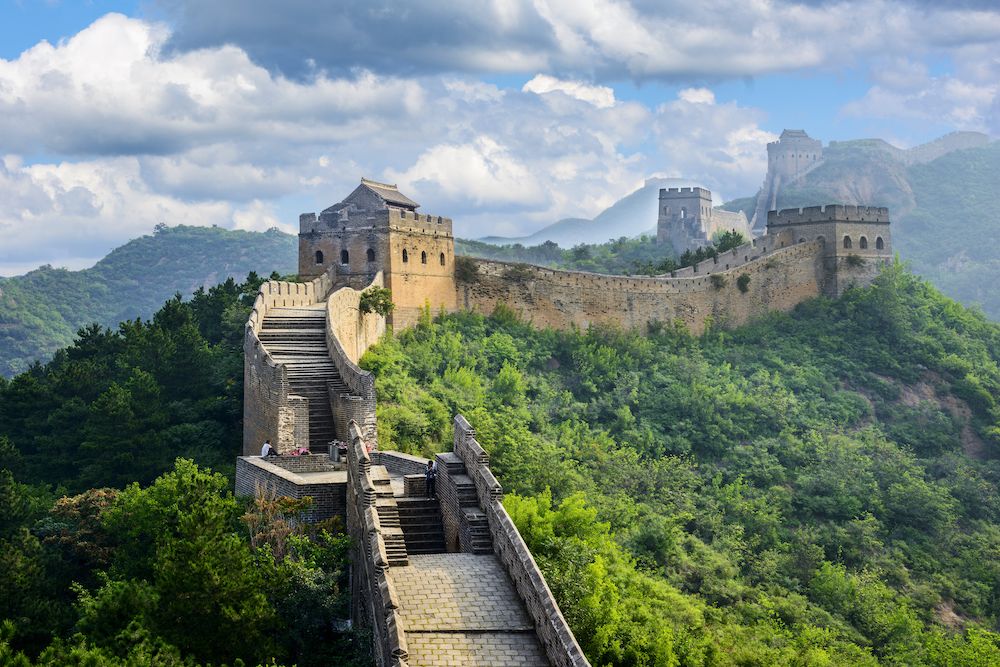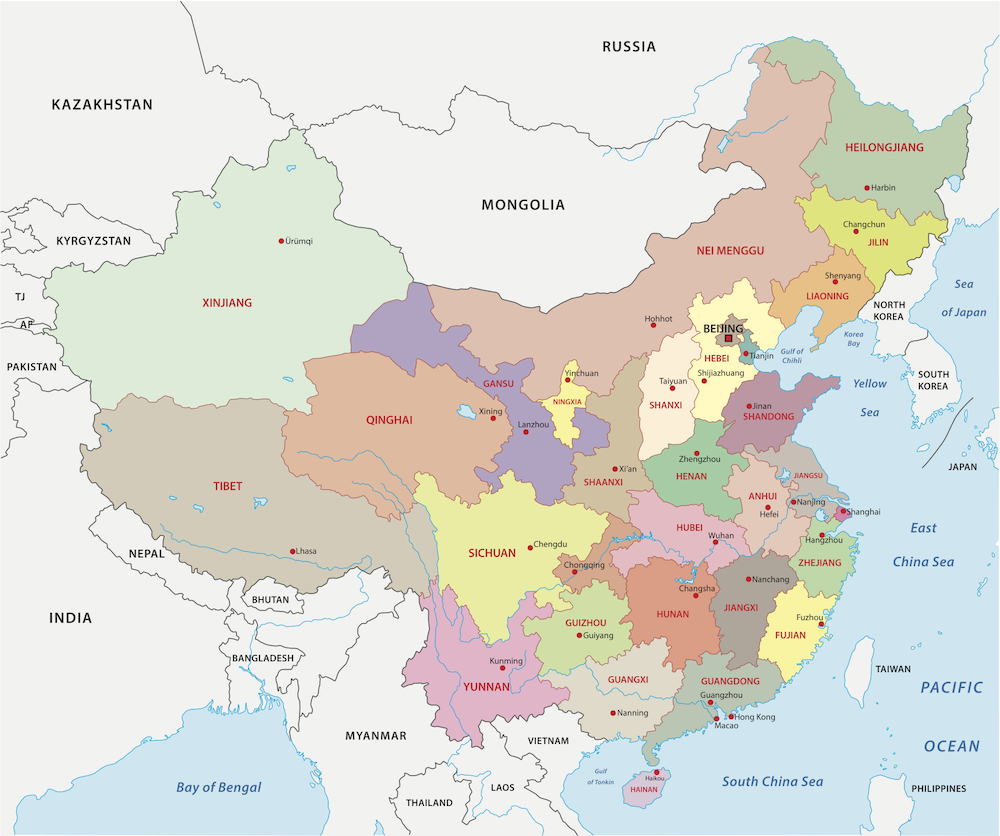China at its borders
Beijing's relations with its neighbors
and minorities

Basically, one could feel sorry for China: Beijing has no real friends in the world - apart from a few countries with dubious reputations, such as Sudan, Syria or Belarus. Whether this fact will change in the foreseeable future is rather unlikely, given China's global political ambitions. In many countries, they are viewed with astonishment or even resentment.

Even if one reduces the radius and only looks at Asia or China's neighboring countries, the assessment does not change fundamentally. And that is actually surprising, because after all, China has fourteen neighbors over a length of 22,000 kilometers on land. In addition, there are a number of littoral states in the South and East China Seas. Theoretically, it should be easy to make friends. But it's like living in a big house where several parties live and no one can really get along with the strongest neighbor.
The problem outlined here has three main causes: China's size, its history and the country's political system. All three carry the potential to become a burdensome mortgage. And this shows up first on China's borders for natural reasons.


RESPEKT FOR GOLIATH
The Middle Kingdom is more than 230 times the size of Switzerland. It is therefore all too understandable that China's smaller neighbors such as Laos, Myanmar or Bhutan not only have great respect for the Goliath right on their doorstep, but that concerns and even fears are increasingly spreading among the local populations of these neighboring countries. Whether China appears on the international stage with great clamor (vis-à-vis India on the occasion of the recent military skirmishes in the Himalayas) or with enticing shouting (vis-à-vis Southeast Asian countries within the framework of the Belt and Road Initiative), the trust of most neighbors in Beijing and the geopolitical goals of the communist state power has its limits.
The mere fact that China is additionally the most populous country on earth does not make things any easier. One can imagine that even larger neighbors such as Mongolia or Russia occasionally wonder how the Chinese party elite will guarantee the supply of its own population in the coming decades - or whether one might have to reckon with (albeit not necessarily territorial, but at least economic) expansionism in an emergency. When the People's Republic of China today claims ownership of the South China Sea, which accounts for almost a quarter of the size of its mainland territory, one is not surprised why some southern and eastern neighbors follow this request with suspicion, to say the least, or even, as the Philippines did in 2016, turned to the Permanent Court of Arbitration in The Hague.


HISTORICAL LEGACIES
History offers another field of conflict that always comes into play when Beijing boasts of its supposedly five thousand years of peaceful and harmonious past and thus wants to prove to the whole world that Tibet or Xinjiang, for example, have always belonged to the great "Chinese nation" (Zhonghua minzu). But watch out: Historians who want to study the genocide of the Mongol Dzungars (ordered by China's Emperor Qianlong in the 18th century) or critically examine the "liberation" of Tibet by the People's Liberation Army in 1951 would do well to conduct their studies outside China. Chinese historiography is under the absolute sovereignty of the Communist Party, and the red emperors do not tolerate any deviations or alternative views under any circumstances. Not even a critical questioning.

However, not even the regime in Beijing can prevent neighboring India from forgetting the 1962 border war, for example, and from overlooking China's multi-billion dollar arms and energy trade with Delhi's arch-enemy Pakistan. Even in Russia, which shares a 3,600-kilometer border with China in the Far East, people - especially at the government level - like to overlook the historical legacies (e.g., the nearly three-decade-long Sino-Soviet conflict) for economic reasons. However, as Putin's system will not last forever, these could resurface at any time. What was the verdict of China's then strongman Deng Xiaoping on the occasion of Gorbachev's visit to Beijing in 1989? Russia, and not Japan or the United States, was Beijing's greatest enemy because it had occupied more territory from China than any other country in its history.


Wer die Opposition in Hong Kong mit allen Mitteln zerstört und gleichzeitig gebetsmühlenartig betont, die Formel «Ein Land, zwei Systeme» sei weiterhin die einzig gültige, nährt berechtigte Zweifel an den wahren Absichten Pekings.
Wer die Opposition in Hong Kong mit allen Mitteln zerstört und gleichzeitig gebetsmühlenartig betont, die Formel «Ein Land, zwei Systeme» sei weiterhin die einzig gültige, nährt berechtigte Zweifel an den wahren Absichten Pekings.
UNWAVERING SYSTEM
Finally, China's political system and all that goes with it evoke uneasy feelings among many of its neighbors. Although the power elite appears cosmopolitan and progressive to the outside world, it rules strictly dogmatically at home and holds the scepter in a tried-and-tested Marxist-Leninist manner. This is not an ideal condition for China's propaganda people to build up the glamorous image of a responsible great power. For many neighboring countries (and not only for them), the gap between Chinese state propaganda and reality, between words and deeds, is too great. Those who, for example, destroy the opposition in Hong Kong with all means at their disposal and at the same time emphasize prayerfully that the formula "one country, two systems" is still the only valid one, nurture justified doubts about Beijing's true intentions. Not only in Taiwan. And anyone who calls for stability in Myanmar in these weeks, but in the past supported the rule of the military junta without batting an eye, should not be surprised when demonstrators in Yangon protest against Beijing's influence in front of the Chinese embassy.
Above all, it is China's treatment of minorities (the vast majority of whom, it should be noted, live on the fringes of the Chinese empire) that could prove to be a clubfoot for those in power: The fear of losing their cultural identity through even more Chinese textbooks is not only driving Mongolians in Inner Mongolia, which is part of China, into the streets, but is also understandably alarming Mongolians across the border in the independent Republic of Mongolia (which was under Chinese rule during the Qing dynasty).
The whole tragedy surrounding the fate of the Uyghurs has finally come to the attention of far-away Europe in the last year or two: Long before that, however, the "Xinjiang problem" had already been an issue in China's relations with its neighboring Muslim states. Even in the Stan countries bordering China, Kazakhstan, Kyrgyzstan and Tajikistan, people were alarmed by Beijing's treatment of the Uyghurs, which was reminiscent of Stalinist practices. Only China's loyal friend Pakistan adopted the view of its mentor and pretends that there is no suppression of traditional Uighur culture and certainly no re-education camps. The New Silk Road project, with its economic benefits, is of course to be carried out without major disruption.




Cover vom Der Spiegel 1978 - damals!
Cover vom Der Spiegel 1978 - damals!
China will not be able to avoid dealing honestly with its history forever - even if coming to terms with the past, as we know it from Europe, seems unlikely in Asia. But whenever China's rulers use all their power to suppress possible sources of conflict in the border areas, Pandora's box will open a little wider. A current "good fortune" for China is that most of its neighbors are authoritarian countries with little democratic background, in other words, human rights do not play a major role for them. For the time being. But times can change quickly, as we know. The distrust of the local populations in these neighboring countries increases the more China flexes its muscles - whether in dealing with minorities at the borders or in intergovernmental economic agreements. China's neighbors realize these sensitivities much more quickly than countries like Switzerland, for whom economic interests come first. But a healthy skepticism about Beijing's intentions would also suit countries far from China's landmass.
It is not only the development in the center that will be decided at the edges of China, but also the fate of Beijing's rise as a world power. The emotive word "Yellow Peril" was on everyone's lips at the end of the 19th century. At the time, it was "only" a specter. But whether it is perceived as real in the world today undoubtedly depends on Beijing's appearance on the international stage.
Dr. Matthias Messmer, publicist and author of "China's Vanishing Worlds" (MIT Press, 2013) and "China at its Borders" (Reclam, 2019).
